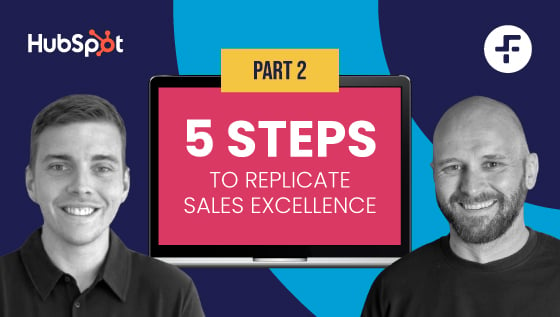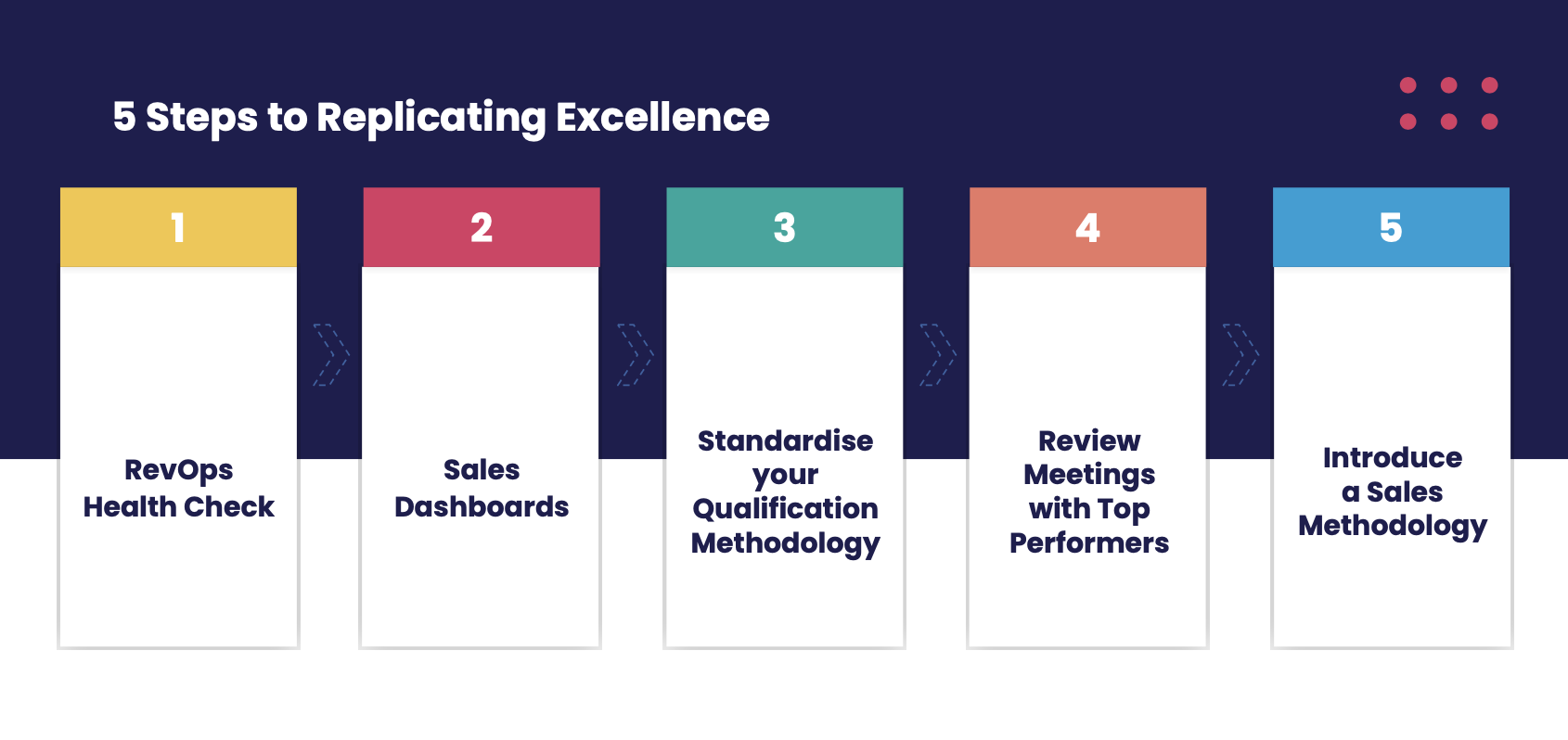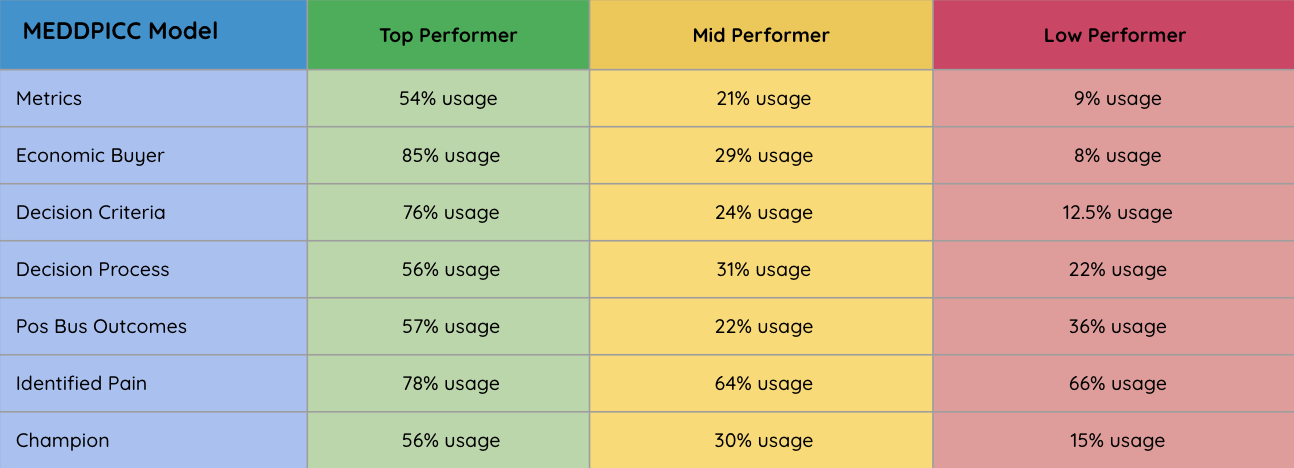


5 Steps to Replicate Sales Excellence (Part 2)




Now that we have delved into the complexities of sales, the importance of relationships, and the challenges of inconsistent team performance in Part 1, it's time to unveil the 5 best practices that will revolutionise your sales team and empower them to create a high-performing unit that consistently replicates excellence.
5 Steps to Replicate Sales Excellence

Closing wins and hitting targets is encouraging and exciting! Unless, of course, it becomes inconsistent and led by a select few in the team. The traditional sales playbook is now fractured, making it crucial for us to begin questioning every step in the sales process to uncover any underlying inefficiencies.
Discover the five best practices that will revolutionise your sales team and empower them to achieve excellence consistently. From conducting a thorough RevOps health check to implementing a standardized qualification methodology, each step is expertly crafted to enhance your team's abilities, streamline processes, and fuel revenue growth.
1. RevOps Health Check
As businesses constantly strive to optimise their sales processes, boost revenue, and enhance overall performance, embarking on this journey without first conducting an in-depth RevOps audit is akin to setting off on a road trip without knowing your starting point or the vehicle you're driving.
-
Understanding the Current State of Affairs: The first step in improving your sales process is to conduct a comprehensive audit of your procedures, tools, and stakeholders. This involves analysing your sales methodology, CRM utilisation, and reporting practices to understand the maturity level of your revenue operations. Key questions to consider include the nature of your sales processes, the effectiveness of your CRM in supporting workflows, the reports and dashboards used by stakeholders, and the level of executive sponsorship and cross-functional collaboration. This assessment provides an objective baseline for improvement.
-
Breakdown of the health check: A comprehensive health check is not a one-size-fits-all process. Instead, it is typically divided into three essential components: outcomes, tactics, and stakeholders.
-
-
-
Outcomes: Understanding what you aim to achieve at this stage of your sales process improvement journey. This might range from conducting a basic health check to enhancing your sales pipeline's velocity or fully integrating RevOps into your business program.
-
Tactics: Evaluating your sales processes, CRM effectiveness, and reporting practices. This step helps identify whether your tools and workflows are facilitating or hindering deal closure and tracking of essential metrics.
-
Stakeholders: Assessing the involvement of different individuals within your organisation, gauging senior-level buy-in, and determining the extent to which RevOps practices are embedded in your team, from sales reps to the CEO.
-
-
-
Conducting an in-depth sales audit is not just a preliminary step; it's a foundational one. By comprehensively assessing your current state, you can identify areas for improvement, chart a clear path forward, and build a robust RevOps foundation that will fuel long-term success in revenue generation. Without this fundamental understanding, it's challenging to achieve the enhanced performance and revenue growth your business aspires to attain.

2. Sales Data and Dashboards:
Harnessing the power of sales dashboards is the key to improving your sales team's performance. By providing visibility, insights, and data-driven decision-making, these tools empower your sales reps, managers, and leadership to make informed choices, track and optimise performance, and customise reports to their unique needs. With this data-driven approach, your sales team can replicate success, streamline processes, and drive growth in the competitive world of sales.
Sales reporting tools offer insights that empower organisations to make choices grounded in data, rather than relying on instinct or guesswork. Real-time data and key performance indicators (KPIs) are at your fingertips, enabling you to navigate the complex sales landscape with confidence.
-
For sales representatives, these dashboards offer transparency into their calls, meetings, emails, and tasks, enabling them to gauge their effectiveness and refine their approaches. The ability to score and prioritise leads based on engagement and profile empowers reps to focus on high-potential opportunities.
-
Sales managers benefit from rep-level performance reports, which delve into deal value, sales cycle length, and close rates. These insights enable managers to identify coaching opportunities and guide their teams to improved performance.
-
For leaders, high-level reporting on regional, segment, or product performance helps them swiftly gauge progress toward quotas and forecast accuracy. This top-tier view allows leadership to remove roadblocks and steer the organisation's strategic direction.
3. Standardise Opportunity Qualification:
Standardising lead qualification brings structure and consistency to your sales process, ensuring that valuable insights are captured and prioritised. By implementing a standardised approach to qualification, you can supercharge your sales team's performance, drive efficient opportunity management, and ultimately boost revenue. So, whether you are dealing with MQLs, SQLs, or any other leads, standardisation is the key to unlocking your sales team's full potential.
A standardised approach to qualification involves the use of programmatic templates, such as playbooks, that sales reps can employ to uncover vital information. Playbooks provide consistency to the sales process, offering a structured method for intros, discovery calls, demos, and more.By providing reps with predefined questions and data entry points, playbooks facilitate the collection of essential data, including prospect needs, pain points, use cases, and potential solutions. This consistency empowers your team to gather critical insights and move leads efficiently down the sales funnel.
The beauty of a standardised approach is that this qualification data is directly captured in the Customer Relationship Management (CRM) system, making it easily accessible for analysis. Furthermore, scoring systems can be linked to the playbooks, enabling reps to prioritise opportunities based on qualification responses.
4. Review Meetings with Top Performers:
Harness the wisdom of your top sales reps by regularly meeting with them to uncover their successful processes and strategies. Analyse their closed deals, sales cycles, call strategies, objection handling techniques, and more to unlock the keys to their excellence. Collaborate with your top performers in brainstorming sessions to refine deal strategies, objection handling techniques, and sales approaches. This partnership mindset is crucial for elevating your team's skills and driving consistent growth.
Here's a list of questions you can ask your top performers and analyse what works best for them:
| Coaching Tools & Techniques |
|
| Question Strategy |
|
| Sales Methodology |
|
| Objection Handling |
|
| Engaging Buying Committees |
|
| Reporting & Sales Metrics |
|
| Lead & Deal Stage Analysis |
|
To effectively translate the insights gathered from top performers into action, several key strategies can be employed. Sales leaders play a vital role in shaping the team's strategic direction, setting goals, and nurturing a culture of growth and excellence.
They should also focus on identifying and removing obstacles that hinder the sales team's performance, streamlining processes, and reducing administrative tasks to allow the team to concentrate on selling.
Ensuring that sales teams maximise the return on investment from their software tools is essential, necessitating the selection of the right tools and their effective utilisation.
Sales representatives should concentrate on scaling and automating prospecting activities through thoughtful sequences and outreach campaigns, saving time and offering a personalised experience.
Centralised communication, structured daily routines, and the use of sales analytics for continuous refinement of sales methods complete the approach to turning insights into actionable improvements.

4. Implement a Sales Methodology:
Success depends on consistency, structure, and a proven methodology, and for businesses seeking to elevate their sales game, implementing a sales methodology is a pivotal step.
1. The Need for a Common Sales Methodology
Bringing consistency and structure to your sales process is a fundamental requirement for improvement. A common sales methodology offers the framework needed to execute deals effectively and streamline your sales approach.
Sales methodologies provide a step-by-step approach that guides your team through the complexities of sales. While various methodologies may have nuanced differences, they share common traits:
- Qualification frameworks for scoring and prioritising opportunities.
- Steps for making contact and probing prospect needs.
- Guidance for identifying stakeholders and decision criteria.
- Playbooks for delivering impactful demos, proposals, and pricing.
- Templates for handling objections and addressing common scenarios.
- Well-defined sales stages mapped to the buyer's journey.
2. The MEDDPICC Advantage
MEDDPICC is highly effective framework that focuses on Metrics, Economic Buyer, Decision Criteria, Decision Process, Identify Pain, and Champion.
According to Ebsta's 2023 B2B Sales Benchmark Report, MEDDPICC's utilisation helped increase companies' win rates 311% and high performers were 437% more likely to complete the qualification criteria. It also helps high performers complete qualification criteria four times more often, providing valuable insights for team-wide improvement.
This data-driven approach allows organisations to analyse both positive and negative behaviours, leading to a more consistent and high-performing sales team.
Coupled with data-driven insights, MEDDPICC improves individual and team performance, influencing training, processes, and sales scripting for a well-rounded enhancement of your sales approach.
Key Steps for Successful Implementation
Implementing a sales methodology effectively requires careful planning and execution. Here are the key steps to follow:
- Qualification Framework: Start by defining a qualification framework that aligns with your chosen methodology. This framework should encompass key elements to confirm, such as the decision-maker, the champion, and pain points.
- Scoring and prioritisation: Develop a scoring system to rank the quality of leads based on elements confirmed in the qualification process. This system assists in prioritising which leads deserve more attention.
- Reporting and Analysis: Utilise custom reporting tools to monitor and measure the qualification process. Dashboards and reports offer insights into lead quality, deal probability, and areas where sales teams should focus their efforts.
- AI Integration: Explore the benefits of integrating artificial intelligence (AI) into your qualification process. AI can automate administrative tasks, such as categorising sales notes or call transcripts, saving time and ensuring consistency.
- Pipeline and Lead Automation: Set up pipelines and lead automation processes that guide leads and deals through the sales process seamlessly. This automation ensures that prospects are nurtured and engaged effectively.
By following these five essential steps - conducting a comprehensive health-check, analysing sales data and dashboards, implementing a standardised methodology, holding review meetings with top performers, and introducing a sales methodology - you will be well on your way to replicating sales excellence across your revenue-generating teams.
The best part is that once you have a clear understanding of your RevOps process, there are numerous opportunities for quick wins and incremental gains that you can readily implement.



Watch the On-Demand Webinar
5 Steps to Replicate Sales Excellence
Together, we'll create a strategic plan to allow you to experience increased revenue, and foster stronger customer relationships, with a team of consistent performers.



